|
The material on this website is intended for educational use only and may not be reproduced for commercial purposes without express permission from the appropriate copyright holder.
Le contenu de ce site Web est destiné à des fins pédagogiques seulement et ne peut être reproduit à des fins commerciales à moins d'en avoir obtenu la permission du titulaire du droit d'auteur approprié.


Singer sewing machines, John Henry Walker, McCord Museum, M930.505.604, 1850-1885

John Tenneil, Punch, London, 30 March 1867






"I am strongly convinced . . . of the justice of giving women otherwise qualified the suffrage. I am strongly of that opinion, and have been for a good many years, and I had hoped that Canada would have the honor of first placing women in the position that she is certain eventually, after centuries of oppression, to obtain. It is merely a question of time all over the civilized world. . . I had hoped that we in Canada would have had the great honor of leading in the cause of securing the complete emancipation of women, of completely establishing her equality as a human being and a member of society with man. I say it is a mere matter of time."
Sir John A. Macdonald, Commons Debates, 27 April 1885, p. 1388.

"I trust that the time is not too far distant, when our men, laying aside their selfishness, jealousy and prejudice, may say to women, come over and help us, not only in making pure and righteous homes, but in making our nation."
Sarah Anne Curzon, Canadian Illustrated News, 1890, cited by Penni Mitchell, Women's Rights
"Only mannish women and womanish men, and a few soft-headed cranks and men who wanted a little cheap notoriety were taking part in the women suffrage movement."
Winnipeg Daily Tribune, 3 March 1893

"It is equal rights which women are seeking, equal rights with men, equal rights in lines of work, equal rights in the protection of the law and equal rights in citizenship."
Freyja, [Finnish newspaper; Freyja means woman] Selkirk, Manitoba. 1898
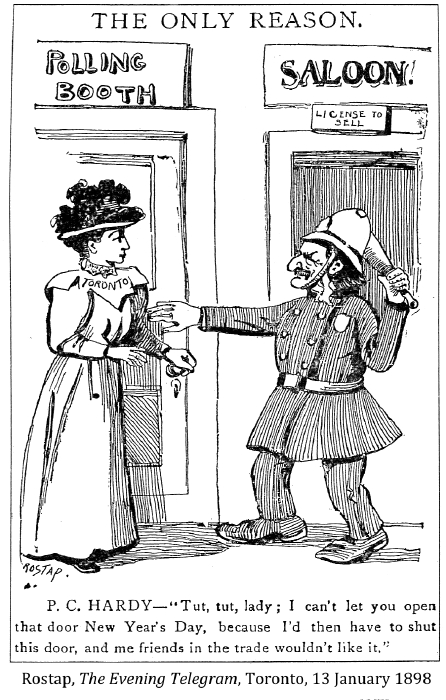


The Peak, Burnaby, 23 October 1975

The New Woman-Wash day, Underwood & Underwood, Toronto, 1901, Library of Congress 89715946

Nellie McClung, 1905-22, LAC Acc. No. 1966-094


Harper's Weekly, New York, 25 April1908

Election Day, E. W. Gustin, artist, 21 January 1909, Library of Congress, 97500226 [Written on a ballot in the bottom right hand corner: Hen Party: "For President – Mrs. Henry Peck – Vice President – Mrs. Wm. Nagg – For Governor – Mrs. Thos Katt."]

Handicapped, Artists' Suffrage League, London, 1909, LC97518871
"Let those who oppose take warning
And keep this motto in sight
No question is ever settled
Until it is settled right."
Victoria Daily Colonist, 6 November 1909
"The settler colonial context and the long shadow of racism are key themes in my book. The Prairie suffrage movement coincided with years of intense colonization. Indigenous peoples were dispossessed of their livelihood, their land, and their rights even as settler women were claiming these rights for themselves."
Sara Carter, Ours By Every Law of Right and Justice Women and the Vote in the Prairie Provinces



Suffrage colouring Album, 25 February 1911, LSE Library, No restrictions, via Wikimedia Commons


The Champion, Victoria, 1912
Women who believe in woman suffrage seem to think that we men want to deprive them of their liberties; but we wish to do no such thing. All men who are worthy of the name of men, place woman upon a very high pedestal, to which no man in his sphere, could ever hope to attain: and we want her to remain there, where she can command our respect and esteem and use the powers that God has given her for the good of humanity . . . Why should she besmear herself with the rottenness of politics?
Letter to the editor, Toronto Globe, 1912


WHERE A WOMAN BELONGS.
According to those who oppose her right to vote.
Art Young, Puck, New York, 1912

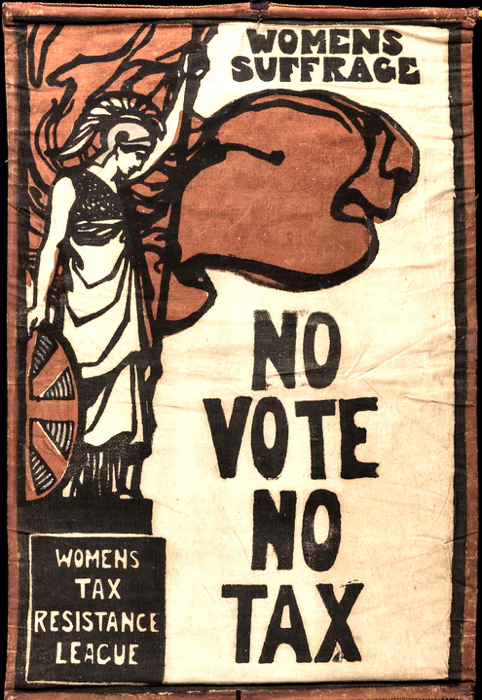
British suffrage banner, 1910? LSE Digital Library




Lew Rogers, The Woman Voter, 1912
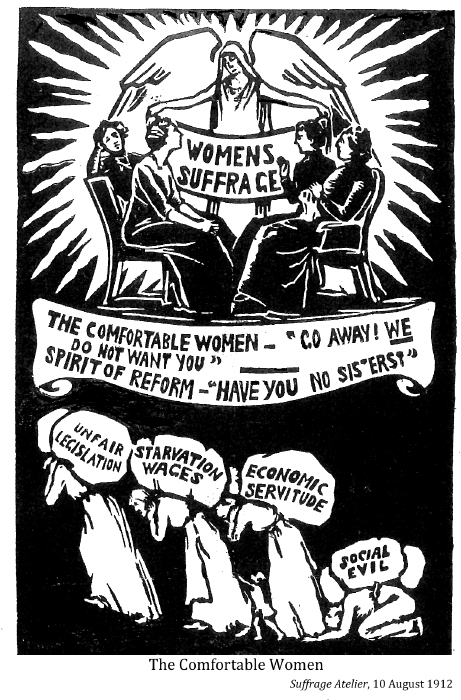


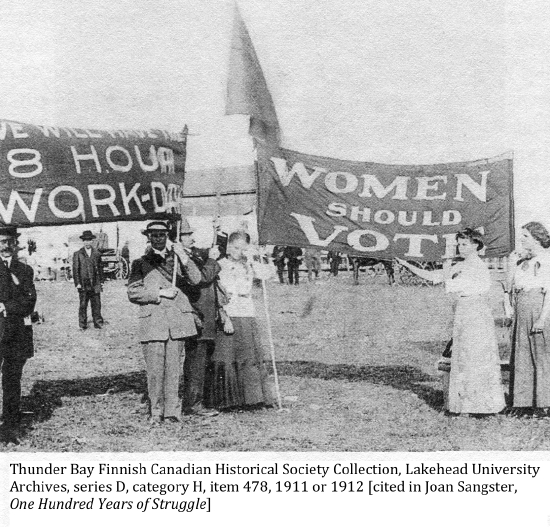
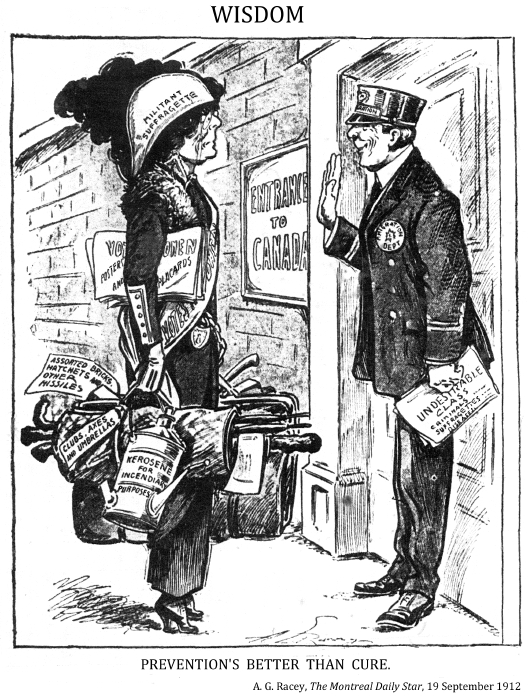

An aggressive seller of religious garments (left) speaking to an aggressive seller of the suffragette cause (right). Marie Caspulaire (is a misspelling of caspular, a religious garment worn to remind people of their commitment to religion) was a well-known older woman who sold caspulars in Montreal]


YOU MUSTN’T ASK TO VOTE
You may be our close companion
Share our troubles, ease our pain,
You may bear the servant’s burden
(But without the servant’s gain;)
You may scrub and cook and iron
Sew the buttons on our coat,
But as men we must protect you—
You are far too frail to vote.
You may toil behind our counters,
In our factories you may slave
You are welcome in the sweatshop
From the cradle to the grave.
If you err, altho’ a woman
You may dangle by the throat
But our chivalry is outraged
If you soil your hands to vote.
L. Case Russell, The Globe , Toronto, 28 September 1912
I am utterly opposed to women’s suffrage in every shape and form. I think too much of women to have her entangled in the mesh of politics. She would be stooping from the pedestal on which she has sat for centuries.
Premier Roblin, Canadian Annual Review , 1912.

London UK


Mrs. Flora McDonald Dennison, Library of Congress LC-DIG-npcc-19077, 1913
[President of the Canadian Suffrage Association 1911-14, she was forced to resign because of her support for the English militant suffragettes.]

Ballots for Both, Toronto Reference Library ca.1913.Ballots.VS, 1913



"Laws concerning dower, property, inheritance, the guardianship of children, the municipal franchise, education, prohibition and many other matters were under provincial control."
Sara Carter, Ours By Every Law of Right and Justice Women and the Vote in the Prairie Provinces



The Woman Voter, May 1913

Metropolitan, New York, July 1913

Judge, New York, 9 August 1913

Life, New York, 24 September 1913
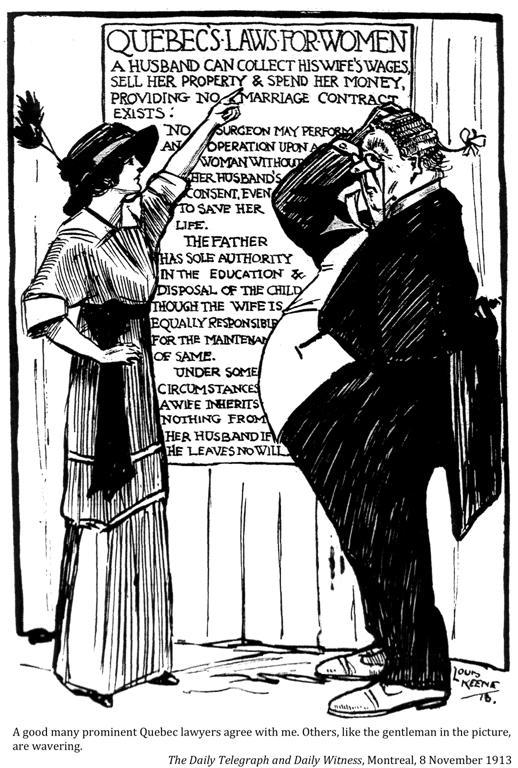

The Woman Voter, New York, November 1913
"We hear of the Pilgrim Fathers, the Revolutionary Fathers, the Confederation Fathers and the Civic Fathers, but what about the women? I think the nations have been fathered to death and the country now needs a little mothering."
Mary Ellen Smith, The Vancouver Province, 18 November 1913 (quoted in Lara Campbell, A Great Revolutionary Wave)

THE WOMAN OF MEANS: "I am not interested in suffrage. I am happy and comfortable. I do not want a vote."
SUFFRAGIST: But do you care nothing for the oppressed and down-trodden? Do you not want to help the little children, the children who are crowding into our factories and filling our courts? Do you not want to help your fallen sisters? Do you not want to fight the growing power of commercialized vice? Do you not want to have better housing and purer food? Do you not want to combat the crime and ignorance and poverty which are surging about your door? All this can only be done effectively through the vote.
The Montreal Herald, 26 November 1913

"Without doubt the democracy of the twentieth century demands the wisdom, sympathy and insight of woman for its full development, and Canadian women cannot set themselves too soon to the solution of the problems now affecting the economic and social well-being of the Dominion. Most men are free to confess that they have made more or less of a botch of trying to run the government by themselves. We look for a new moral impetus, a saner outlook and wider human sympathy to enter into the settlement of our public questions with the advent of women into public affairs."
The Grain Grower’s Guide, Winnipeg, 4 February 1914
"I believe woman suffrage would be a retrograde movement, that it would break up the home, and that it would throw the children into the arms of the servant girl."
Sir Rodmond P. Roblin, The Manitoba Free Press ,28 June 1914
"I believe that woman suffrage would be a retrograde movement, that it will break up the home. . . The majority of women are emotional and very often guided by misdirected enthusiasms, and if possessed of the franchise would be a menace rather than an aid."
Sir Rodmond Roblin
"Nice women don't want the vote."
Sir Rodmond Roblin
"When I come home at night, I don't want a hyena in petticoats talking politics at me. I want a sweet, gentle creature to bring me my slippers."
Sir Rodmond Roblin
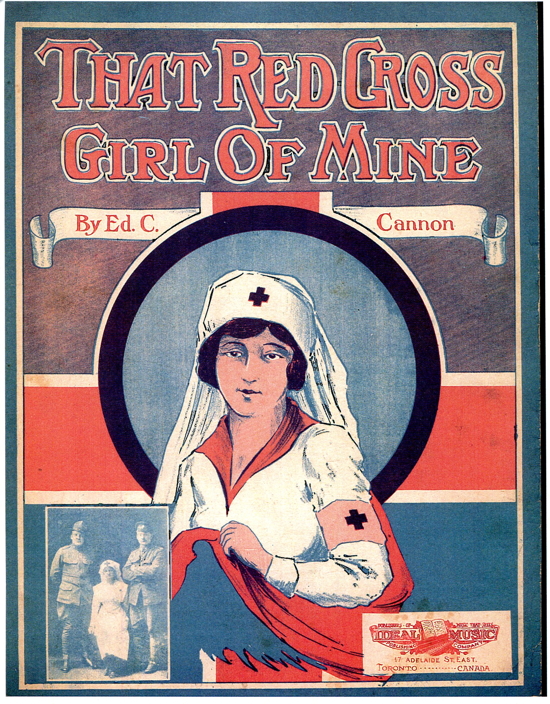
1914 Music Nurses


Puck, New York, 18 May 1914

SAVAGERY TO "CIVILIZATION"
THE INDIAN WOMEN: We whom you pity as drudges reached centuries ago the goal that you are now nearing.
WE, THE WOMEN OF THE IROQUOIS:
Own the land, the lodge, the children.
Ours is the right of adoption, of life or death;
Ours the right to raise up and depose chiefs;
Ours the right of representation at all councils;
Ours the right to make and abrogate treaties;
Ours the supervision over domestic and foreign policies;
Ours the trusteeship of the tribal property;
Our lives are valued again as high as man's.
Puck, New York, Joseph Keppler, artist, 16 May 1914




Lou, Rogers, Judge, New York, August 1914

"Give Mother the Vote!" Missouri History Museum, Rose Cecil O'Neill, 1915, Public domain, via Wikimedia Commons
"No woman, idiot or criminal shall vote."
Nellie McClung, In Times Like These, 1915
[The Manitoba Elections Act passed in 1913 stated that "Every person shall be entitled to vote at the elections . . . if such person (a) is of the male sex." Patients in lunatic asylums and criminals were not allowed to vote.]
"We firmly believe that if the women of these warring countries had possessed the power of the ballot, this awful slaughter of precious life [World War I] would never have clotted the twentieth-century civilization."
Western Methodist Recorder, February 1915
When…about 30% of the women of Canada are wage earners, it seems rather foolish to talk about women being protected from the battle of life. We are human, just like men. In reason and intellect, we claim neither superiority nor inferiority, hence our reasons for wanting the vote are just the same as men’s.
Mrs. Elizabeth Tuckey, Morning Albertan , Calgary, 1 March 1915.

Life, New York, 6 May 1915

Men alone are not capable of making laws for men and women. Laws are made from man’s standpoint. There is a law in this province whereby a man can sell all he has without the knowledge or consent of his wife, and can skip out, leaving her and her children without anything. There is a law by which a man can will away all his property and leave his wife nothing. There is a law by which a father is heir to his child’s property. Children have only one legal guardian, only one parent in the eyes of the law, and that parent is the father. Such laws as these are on the statute books, yet people will say that women should trust to man’s chivalry.
Nellie McClung, newspaper report, 20 May 1915
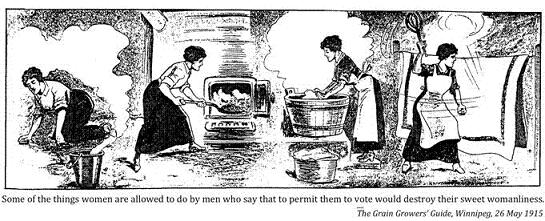
“Now you forget all this nonsense about women voting,” Premier Roblin [of Manitoba] went on in his suavest tones. “You’re a fine, smart woman, I can see that. And take it from me, nice women don’t want the vote.” His voice dripped fatness.
“By nice women,” I said, “you probably mean selfish women who have no more thought for the underpaid, overworked women than a pussycat in a sunny window has for the starving kitten in the street. Now in that sense I am not a nice woman, for I do care. I care about those factory women, working in ill-smelling holes, and we intend to do something about it, and when I say ‘we’ I’m talking for a great many women, of whom you will hear more as the days go on.”
Nellie McClung, The Stream Runs Fast , 1945.
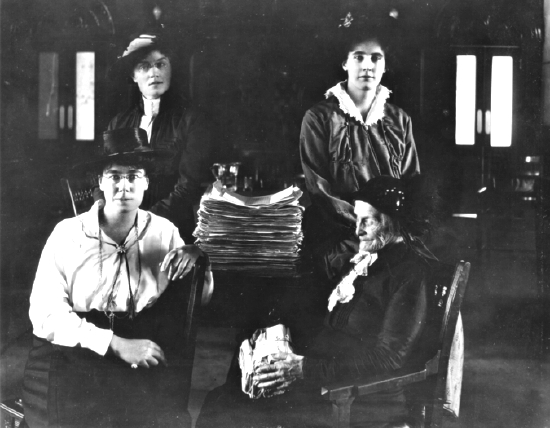
Presentation of petition by the Political Equality League for the enfranchisement of women. Signed by 39,584 people. Archives of Manitoba/Archives du Manitoba, Events 173/3, N9905, 1915
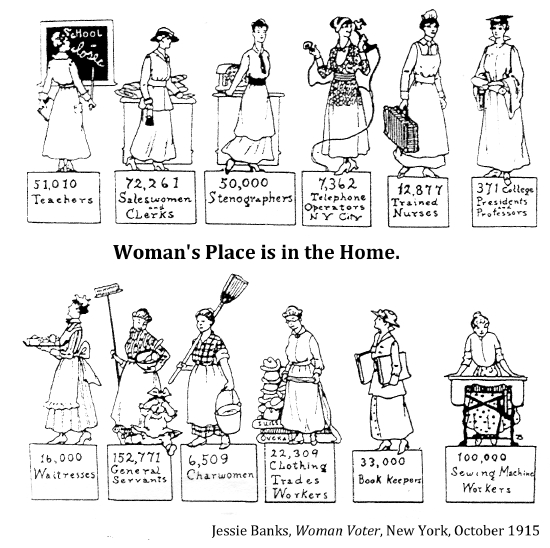

Judge, NY, 9 Oct 1915
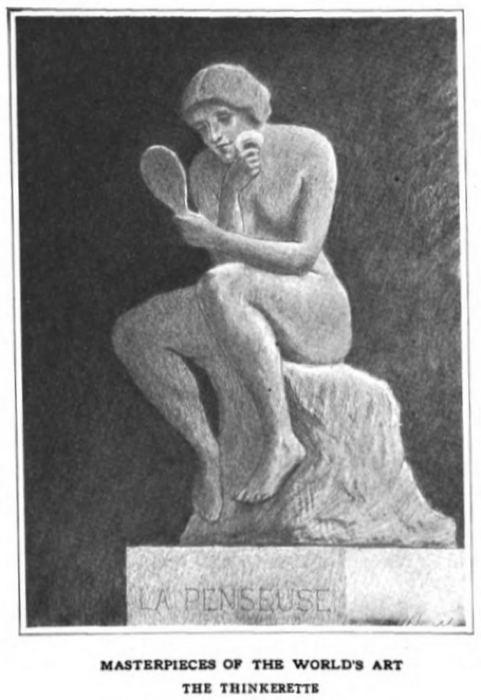
Life, New York, 28 October 1915







Manufacture de la compagnie Northern Electric Co. Ltd. LAC Canada. Ministère de la défense nationale / Bibliothèque et Archives Canada / PA-024627, ca. 1916
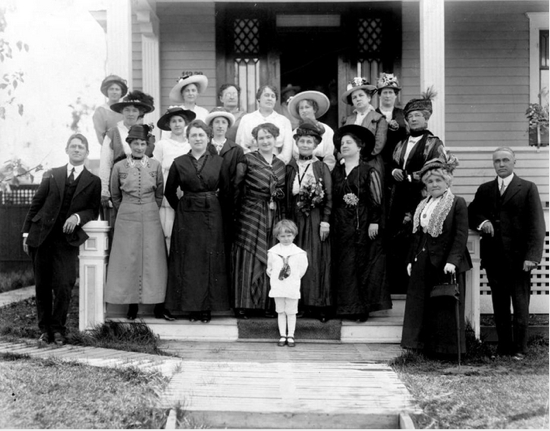
Group photo taken at Nellie McClung's home in Edmonton. Nellie is behind her little boy, Mark, and to the left; to Nellie's left is Emmeline Pankhurst, and to her left is Emily Murphy, 1916, BC Archives B-06786
"Except judges, Chinese, Indians, criminals, lunatics and persons who for corrupt practices have temporarily forfeited their right to vote, every person, whether male or female, who is a British subject by birth or naturalization, of the full age of twenty-one years, and who has resided in Saskatchewan for twelve months . . . is entitled to vote."
Saskatchewan Election Act, 1916


Woman's Journal, Boston, 12 February 1916
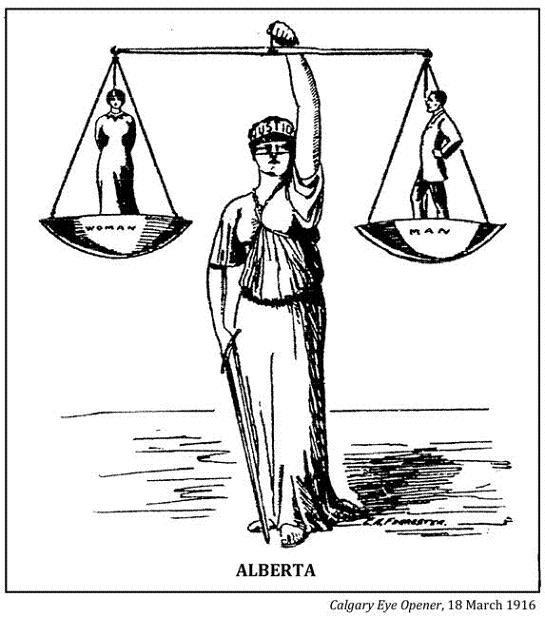



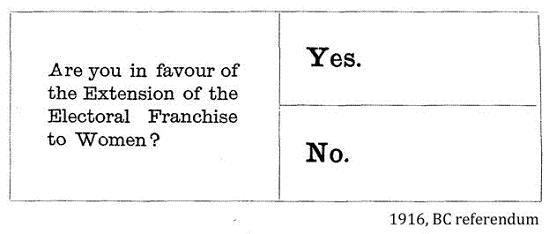




Judge, New York, 3 February 1917

LSE Library, 1911-1917, No restrictions, via Wikimedia Commons

Woman's Journal, Boston, 13 January 1917

[Ironically this cartoon shows an Indigenous woman representing BC welcoming a newly enfranchised settler woman to full political citizenship even though Indigenous women could not vote.]
"[On the 5 April 1917] The franchise was extended to the majority of settler women in British Columbia. But another thirty-two years would elapse before the provincial government allowed First Nations, Japanese, Chinese, and South Asian Canadian women and men to vote."
Laura Campbell, A Great Revolutionary Wave Women and the Vote in British Columbia
[When did women in BC get the vote?
5 April 1917 except for:
Chinese Canadians from 1874-1947
First Nations 1874-1951
Japanese Canadians 1895-1949
South Asians 1907-1949]

Le suffrage universal, Le´onard, Les Temps nouveau, 1902


The Woman Citizen, Chicago, 23 June 1917
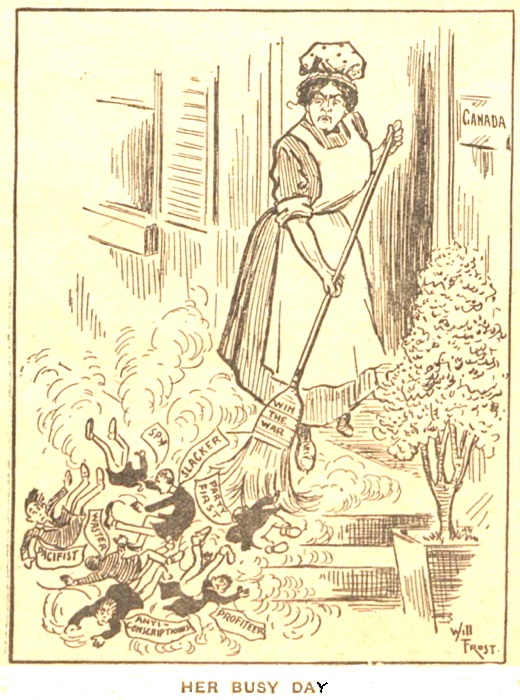
The Canadian Courier, Toronto, 28 July 1917



The Woman Citizen, New York, 8 December 1917

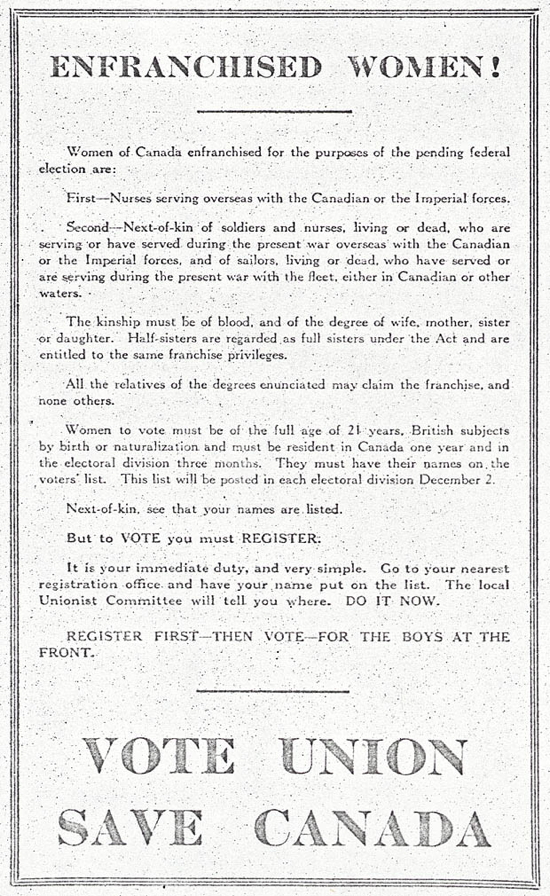
Library and Archives Canada, C-4358, 1917

Credit: Library and Archives Canada, Acc. No. 1984-4-917

Nursing Sisters at a Canadian Hospital voting in the Canadian federal election. Des infirmières militaires d'un hôpital canadien en train de voter aux élections fédérales canadiennes. LAC PA-002279, December 1917
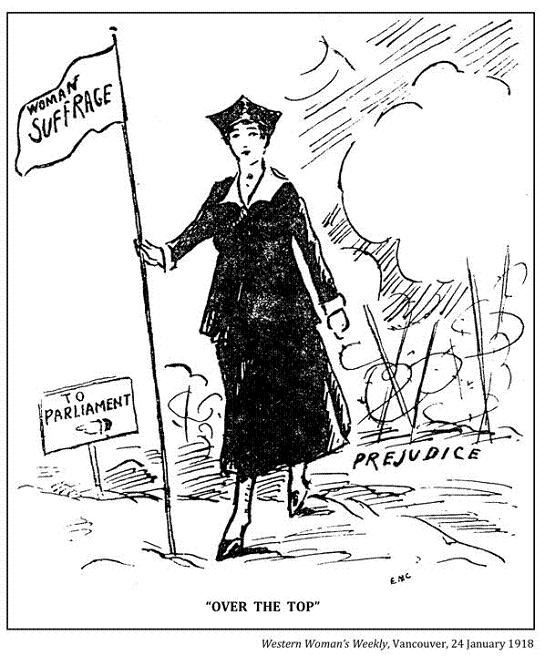


The Woman Citizen, New York, 6 April 1918


The Woman Citizen, New York, 8 June 1918






Ladder of opportunities available to women, New York Times Current History, October 1920
[Slavery, house drudgery, shop work, clerks-agents-maids, teachers -caretakers, bookkeeping-stenography, nurse-governess, private secretary, arts-crafts-science, business affairs, school affairs, church & charities, war workers, public office, government office, law-medicine, EQUAL SUFFRAGE, notary public, wage equality, political appointments, positions of trust, highest elective offices, executive, legislative, senate-congress-governorship, presidency.]
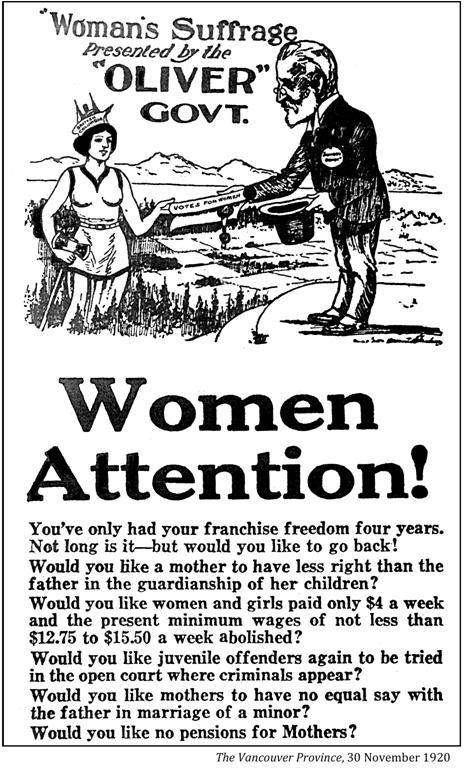




21 September 1921



1921 Agnes MacPhail, Library and Archives Canada, C-006908
[Agnes Macphail was the first woman elected to the Canada's House of Commons. The country waited fourteen years for the next.]
"A great number of these young men are students, who, in the college and universities, have acquired political knowledge... [They] frequent the clubs and assemblies where political questions are discussed. But where and how will girls of the same age acquire political knowledge? Will they be advised to attend clubs and public meetings, to go to places where they would see and hear nothing good, where their modesty, delicacy of feelings and moral qualities would be more or less affected? Knowing what I know, if I had girls of that age, I would certainly forbid them going to these places, or these meetings."
Senator David, Hansard, 1922




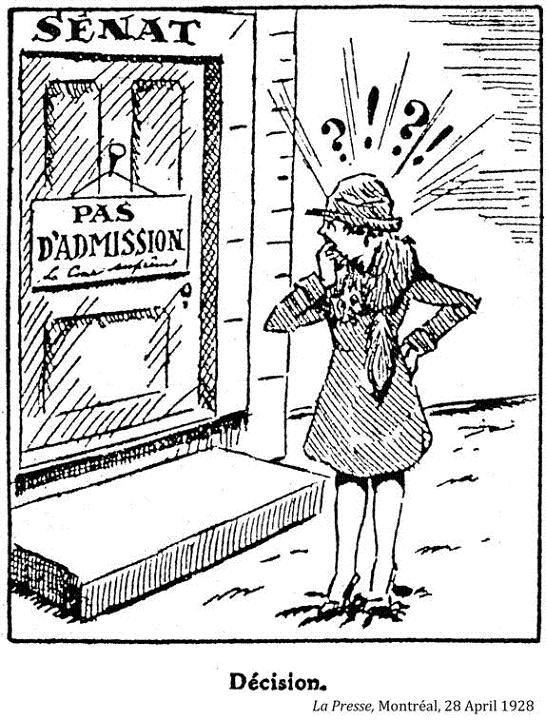

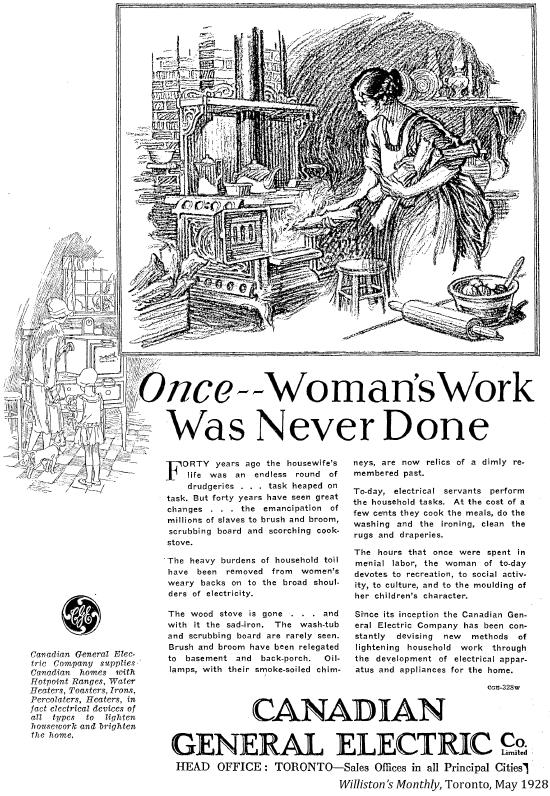

"All honor to the noble five Albertans who pushed this matter to the highest court in the realm... As one who has been an advocate of equal rights and privileges for women, I have particular feelings of rejoicing over the decision."
Reverend C.T. Scott, 1929
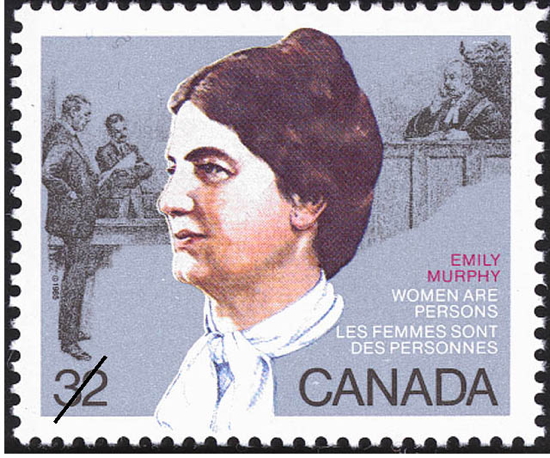
LAC Canadian Postal Corporation e000008203
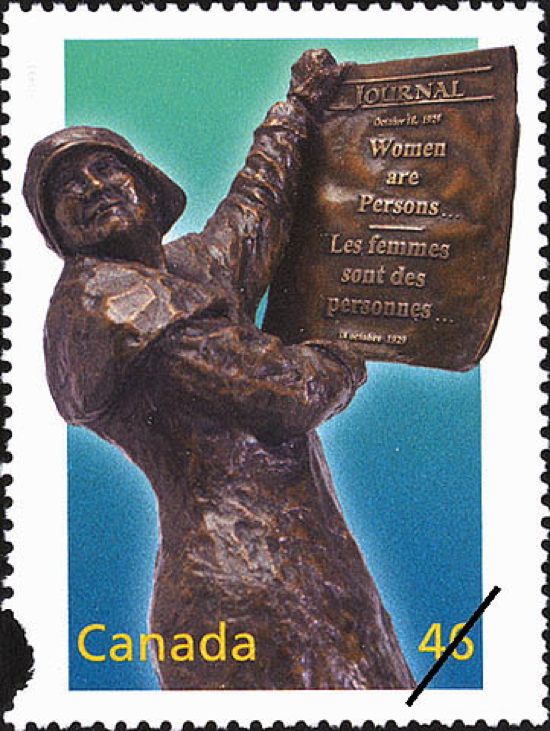
LAC Canadian Postal Corporation 2000







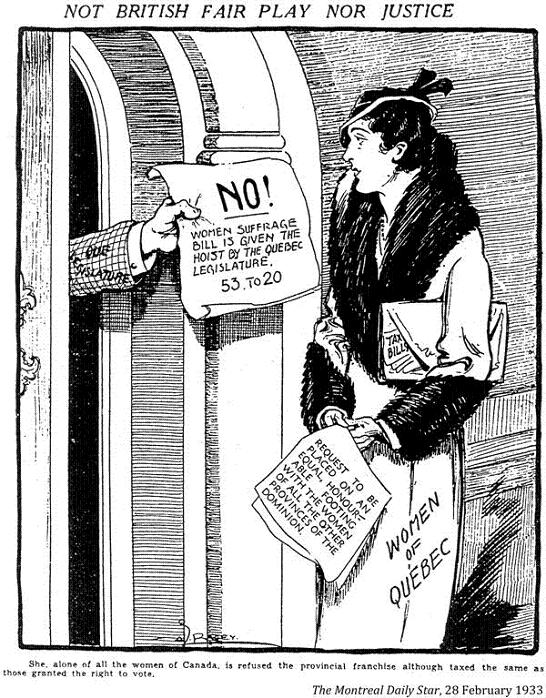
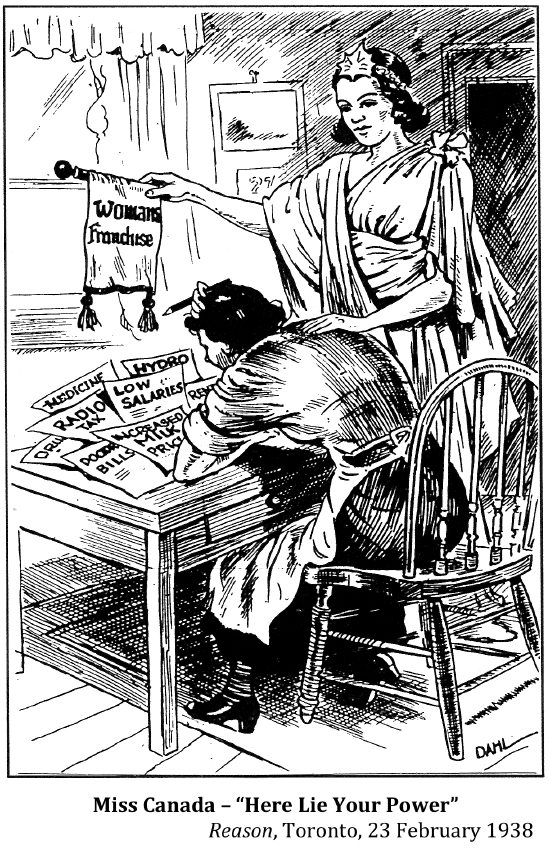

Unveiling of a plaque commemorating the five Alberta women whose efforts resulted in the Persons Case, which established the rights of women to hold public office in Canada. LAC, C-054523NFB Eugene Finn 11 June 1938


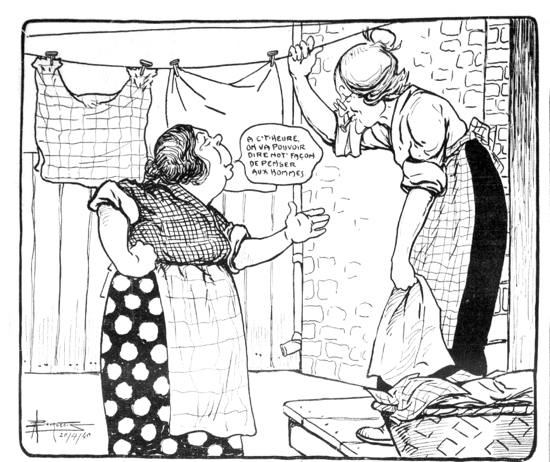
"A c't'heure, on va pouvoir dire not' façon de penser aux hommes."
"Now we'll be able to tell the men what we think."
Alberic Bourgeois, La Presse, Montréal, 20 April 1940



Canadian Citizenship Act and repeal of Chinese Immigration Act, 1 January 1947
Changes to federal legislation allow Chinese and South Asian Canadians to vote





First Nations Can Now Vote in Federal Elections, 1 July 1960
First Nations peoples receive the right to vote in federal elections while retaining their status and treaty rights.






Women in National Parliaments at end of women's suffrage:
http://archive.ipu.org/wmn-e/classif.htm
|


































































































































































